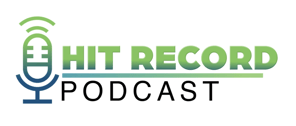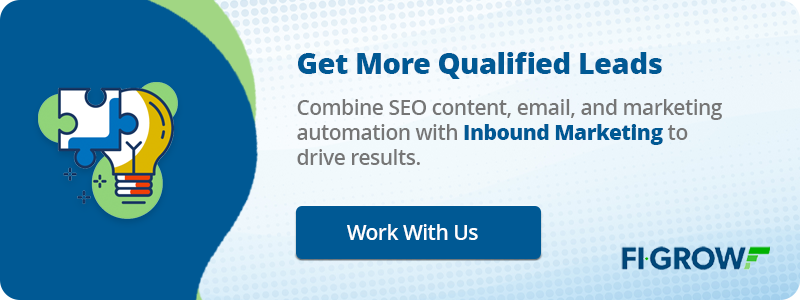Episode 66 - Here's a Few Spring 2024 Google Search Tips for Banks & Credit Unions


Don't Miss An Episode, Subscribe Now

In this conversation, Meredith Olmstead, CEO of FI GROW Solutions, and Rebecca Gwaltney,FI Grow's inbound marketing manager, delve into the critical role of Search Engine Optimization (SEO) for banks and credit unions. They explore the latest trends in consumer search behavior and discuss strategic SEO practices aimed at boosting the online presence of financial institutions.
Key Takeaways:
1. SEO is Fundamental for Visibility: SEO involves optimizing content with relevant keywords to ensure a bank or credit union's services appear prominently in search engine results. This visibility is crucial for attracting potential customers searching for financial products or solutions.
2. Trends in Consumer Searches Influence Strategy: Consumer search behavior, including the volume and nature of searches, guides the content and product offerings of financial institutions. For instance, rising searches for debt consolidation loans indicate a market need that banks and credit unions can address through targeted products and content.
3. Local SEO and Long-Tail Keywords Offer Competitive Edges: Incorporating local keywords into content can significantly improve a financial institution's visibility in specific regions. Additionally, long-tail keywords, which are more specific search queries, can attract a more targeted audience with less competition, offering a strategic advantage in content marketing.
Transcription:
Meredith Olmstead:
Hi there. I'm Meredith Olmsted, CEO and founder of FI GRO Solutions. We are a digital marketing and sales consulting agency and we work exclusively with banks and credit unions. I am here with Rebecca Gwaltney. Rebecca is our inbound marketing manager, director, know all things important. Say hi, Rebecca.
Rebecca Gwaltney:
Hi everyone. Thanks for joining us.
Meredith Olmstead:
So Rebecca and I were just having a really... Actually, she shared some really cool statistics. She does this a lot with our team on an ongoing basis. I'm going to knock my microphone over. So on an ongoing basis, Rebecca likes to share with us trends that she is seeing in search that have a lot of impacts on consumer behavior for banks and credit unions. So I was like, you know what? This is such good information. We share it sometimes with our clients, and I was like, "Why don't we do a podcast about this and just talk about it?"
So first thing is SEO. So the first thing is everybody's like, okay, we need SEO. Everybody needs SEO. What is SEO? What's the point of SEO? So Rebecca, in a nutshell, what's SEO and what's the point of worrying about it for a bank or a credit union?
Rebecca Gwaltney:
Yeah, absolutely. Great question. SEO stands for search engine optimization. Although it's a big term, we don't want it to be confusing. We're trying to really infuse your content so that it ranks better when people search for something in the Google Search bar. So if they're looking for a specific product or a solution to an issue they're facing, we want to include certain keywords or terms so that you show up hopefully on the first page, but closer to the top.
Meredith Olmstead:
Gotcha. So we pay attention to a lot of different factors. We're not trying to stuff a bunch of keywords like one keyword 500 times on a page. That's spammy and doesn't do well. But when we are doing research, we always research for campaigns we're doing for clients, and we also do a lot of research around new websites as we're building them. So we're constantly refreshing all of our SEO research, which is cool because we'll know that, okay, two years ago, mortgages or first time home buyer was really, really big. Obviously, when the interest rates were low, it was even more popular. But we know that now that search volume has trended down and we're seeing search volume and other areas trending up.
So besides monthly search volume, and that's the actual number of people searching, what else do you look at when you're doing your research?

Rebecca Gwaltney:
Right. Yep. So in addition to the monthly search volume, difficulty is a huge indicator. So we all love the keywords personal loan or mortgage or home equity loan. We love those. But there's a lot of competition, not just with local banks and credit unions, but huge financial institutions and other organizations. They all want to rank for the same thing. So seeing the difficulty score, the higher it is, the harder it is, we need to include those keywords. We know it's important, but we also try to filter in keywords that are lower on that spectrum because we're more likely to rank and they still answer the questions that our consumers, members, customers all have. So difficulty is a huge one.
The other one is click. So if they type in a question and the answer's right there in the search result, they're not going to have to click to learn more. So if something has high search volume but zero clicks, we know we might need to avoid that keyword and we need to look for some other terms instead.
Meredith Olmstead:
Gotcha. So because our clients, a lot of them, are regional financial institutions, we try to give them a leg up on the big guys like the Bank of Americas that are spending millions of dollars on websites and search. We know we're not going to compete in some of those big, highly competitive markets for different terms.
Also, like you said, we don't want to surface the answer, the zero click. That Google does so much now where you ask a question, it literally answers the question for you right there on the Google search page, and you never go to the person's website or to the company's website who created or who provided the information. So don't want to do that either. Okay. That makes sense.
Then basically, this is all really relevant around a blog, websites, landing pages, product and service pages particularly. It can also be relevant to digital ads because we know that if there's big trends in search behavior for consumers, we know that people are out there in market looking for a product or service at a larger frequency. That tells you, hey, maybe we should start running some digital ads around this product or service. Okay, cool.
Rebecca Gwaltney:
Definitely. Yeah, all hands on deck. All departments.
Meredith Olmstead:
So it's March of 2024, so I'm going to date us because this is important stuff in terms of it being relevant now. So in March going into April or spring of 2024, you found four really interesting trends or things that had shifted in consumer search you wanted to share. So I'll let you take it away and we can talk about what each of them means for a bank or a credit union.
Rebecca Gwaltney:
Perfect. So since the end of last year, so October 2023 'til now, March 2024, debt consolidation and debt consolidation loans have shown a large increase. So we're talking monthly search volumes from around 52,000 for debt consolidation, all the way up to 89,000 and debt consolidation loan has increased from 42,000 all the way up to 85,000 monthly searches.
Meredith Olmstead:
You're talking about almost doubling basically.
Rebecca Gwaltney:
Yeah. Yep. This is on people's minds. They want assistance and they're looking for answers.
Meredith Olmstead:
I mean, people might have still been interested in debt consolidation in past years. Obviously, these things ebb and flow, but they're really looking for an actual product that is designed to do like a debt consolidation loan. That's really one of the big ones. So if you are a regional institution, you may want to put together a product or be promoting your existing products with that language around it. Debt consolidation or debt consolidation loan product. Okay.
Rebecca Gwaltney:
Yep. Absolutely. I love the actionable steps too, right? Because the information's nice, but it's like what do we do with it? So I love the tips. I love taking it there.
Meredith Olmstead:
So what else are you seeing, Rebecca?
Rebecca Gwaltney:
Yeah, home equity loans, we're seeing the same type of activity and the same trend. So about 74,000 monthly searches per month for the term home equity loan has increased to 108,000. Home equity loan rates has also almost doubled from 25,000 to 46,000, and HELOC versus home equity loan, which is a term we like to use for blogs and content to explain the difference, there's more of an interest in understanding the differences between the two. It went from 3,200 up to 9.7. So fantastic.
Meredith Olmstead:
So seeing some opportunities to educate the marketplace, seeing some definite trends where people are probably looking to put in a new application, maybe refinance, maybe they're not interested in purchasing a new home. We're not seeing huge trends around mortgage topics, home loans, those kinds of things. But we are seeing some refinance or some second mortgage interest potentially. Trying to get your head around your market for those kinds of things. Maybe trying to drive your interest rate option down there. Okay. What else? So a couple other things you found that were interesting. What else did you see?
Rebecca Gwaltney:
Yeah, so not as much trends, but something to keep in mind when you're doing SEO is that you never want to forget your local keywords as well. So whether that's the state that your bank or credit union is in, whether it's a local term, local town that your branches are in. Always through the research on those exact terms, sometimes you'd be surprised, even if it's 500 for a monthly search volume or 1,000, it's definitely worth including in some of your content, blog, part of a pillar because it's really narrowing down the focus and helping with your local search. So that's a very important factor.
Meredith Olmstead:
So what would be a search phrase as an example for that?
Rebecca Gwaltney:
Yep. Best bank in Massachusetts would be a great one, or free checking account in Massachusetts or best checking account in Massachusetts. Definitely dive in. Again, the trends change and they ebb and flow, but at least 500 was the monthly search volume for the best bank in Massachusetts. Something as simple as changing bank to banks can make a large difference sometimes in what you see. So dig around.
Meredith Olmstead:
Yeah, so it makes sense to make sure you've got those Google My Business pages, that everything is connected, that you've got your local search optimized with individual location pages for each of your brick and mortars on your website. A lot of people don't realize that, but a big part of local search is making sure that you have a individual website page for every brick and mortar, and then it's connected to your Google My Business page for that brick and mortar location. It's a pain, but it's a one-time pain. You set it all up, connect it all, and that really can help surface you when people are doing that near me or in Boston, in Phoenix, in Dallas. Those kinds of searches can really help connect the dots with the local search. Okay, cool. Then there was a last one that was a really long search phrase that you said you found that was interesting.
Rebecca Gwaltney:
Right. Yep. So short tail keywords similar to savings account versus long tail keywords. We always try to dig a little bit deeper to see if there's other questions being asked. One term that we did find, which was exciting, we wanted to share which savings account will earn you the most money. So this is clearly a question that consumers, customers, members want to know. The monthly search volume was 5,200, which is solid, but our favorite part about all of it was the difficulty was six, which technically ranks as easy. So we did a blog for one of our clients and they ranked as high as the eighth spot answering this question, and were able to filter in-

Rebecca Gwaltney:
Yeah, there's things that count options. So you're still getting to the point of what you want to share, but you're doing it in a little bit more roundabout way and you're not competing with the big boys.
Meredith Olmstead:
Yeah, if you were trying to drive deposits, core deposits and you had a high yield savings option, that would be a perfect example of a long tail problem or a question that you were trying to answer for a potential new customer. Then you bring them in, answer that question, and then provide them with a potential high yield savings account that you could encourage them to make a large deposit into just to start earning that money that they just did their research on.
Awesome. All right, great. Well, this has been really useful. Short, sweet, to the point. I think what we'll do, Rebecca, is maybe just come back to you a couple of times a year and refresh some of this. Because I think just knowing some of this insight can be really, really useful for content creation and for how marketers at banks and credit unions are spending their time creating new content and also, positioning products or creating new products out there.
So great. Thank you so much. We really appreciate you. If you're interested in learning more about marketing or content for your banker credit union, please visit us@figro.com. We have lots of great content there, lots of other podcasts. We have lots of blogs and case studies. So would love to help you if you're interested in reaching out to us and be a resource for you. Otherwise, let's just all get out there and make it happen.







Blog comments